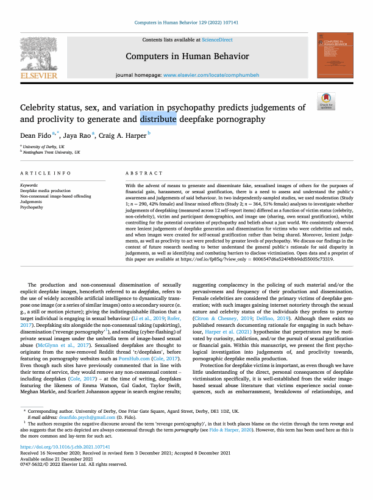Cybercrimes
Celebrity status, sex, and variation in psychopathy predicts judgements of and proclivity to generate and distribute deepfake pornography
Open Access: No.
Abstract
With the advent of means to generate and disseminate fake, sexualised images of others for the purposes of financial gain, harassment, or sexual gratification, there is a need to assess and understand the public’s awareness and judgements of said behaviour. In two independently-sampled studies, we used moderation (Study 1; n =290, 42% female) and linear mixed effects (Study 2; n =364, 51% female) analyses to investigate whether judgements of deepfaking (measured across 12 self-report items) differed as a function of victim status (celebrity, non-celebrity), victim and participant demographics, and image use (sharing, own sexual gratification), whilst controlling for the potential covariates of psychopathy and beliefs about a just world. We consistently observed more lenient judgements of deepfake generation and dissemination for victims who were celebrities and male, and when images were created for self-sexual gratification rather than being shared. Moreover, lenient judgements, as well as proclivity to act were predicted by greater levels of psychopathy. We discuss our findings in the context of future research needing to better understand the general public’s rationale for said disparity in judgements, as well as identifying and combating barriers to disclose victimisation.
Relevance
This study showed that, among other things, people with greater tendencies towards psychopathy (e.g., antisocial behavior) and victim blaming are more likely to create and share deepfake sexual images.
Citation
Flynn, A., Powell, A., Eaton, A., & Scott, A. J. (2025). Sexualized Deepfake Abuse: Perpetrator and Victim Perspectives on the Motivations and Forms of Non-Consensually Created and Shared Sexualized Deepfake Imagery. Journal of interpersonal violence. https://doi.org/10.1177/08862605251368834

